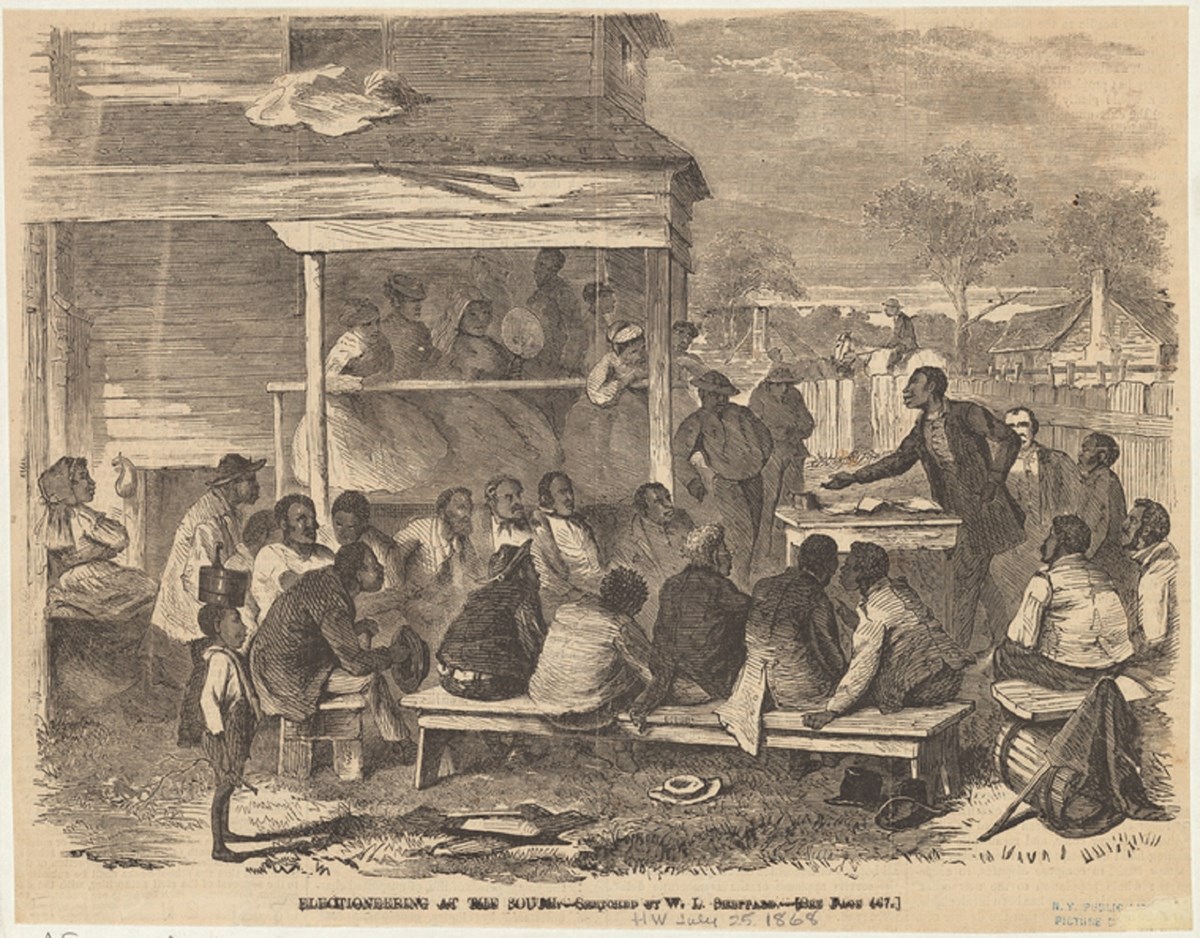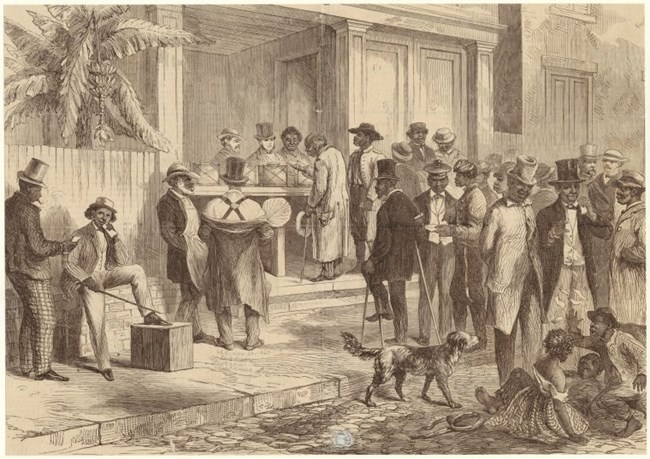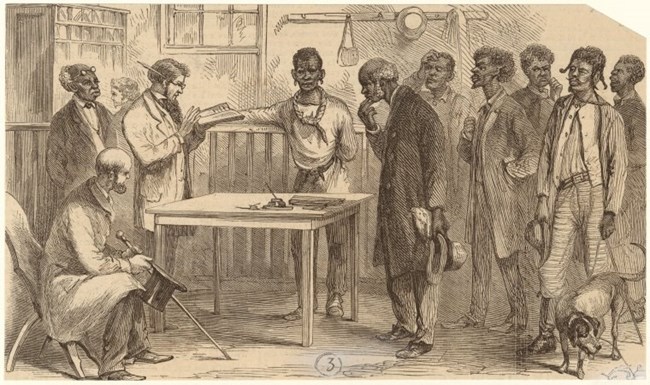#NNPA BlackPress
150 Years After Ratification of the 15th Amendment, Black Votes Are Still Contested
NNPA NEWSWIRE — “The right of citizens of the United States to vote shall not be denied or abridged by the United States or by any State on account of race, color, or previous condition of servitude. The Congress shall have power to enforce this article by appropriate legislation.” So reads the 15th Amendment, ratified on February 3, 1870, the third of what came to be known as the Reconstruction amendments.
The Black fight for the franchise
By Mel Reeves, Community Editor, Minnesota Spokesman-Review
As conservatives in some states continue to assault the fundamental right of citizens to vote by purging voter rolls, requiring certain ID’s and adding onerous burdens to dissuade folks from voting it’s important to note that this is nothing new. In fact, this week marks the 150th Anniversary of the Republican Party’s effort to put a halt of the former Confederate states’ and some former Union states’ efforts to prevent the newly freed slaves from exercising the franchise.
Voting, or the ability to have a say or at least the appearance of a voice, is seen as a fundamental, basic, guaranteed right in American democracy. Taxation without representation is what led to this country’s violent break with its then-colonial master England.

Electioneering in the South, circa 1868. Art and Picture Collection, The New York Public Library, https://digitalcollections.nypl.org/items/510d47e1-3fa3-a3d9-e040-e00a18064a99
The right to vote is seen in the U.S. as one of the most fundamental tenets of the nation’s democracy. However, historically many people who qualified as citizens of the republic were denied the right to vote from the beginning, including women and poor White men. In the early days of the Republic, the franchise was given only to White males who owned property.
Immediately after the Civil War, as a result of Union soldiers being stationed in Southern states, newly freed slaves were allowed to vote. Before the passing of the 15th Amendment, Congress had passed the Territorial Suffrage Act as means of allowing Blacks to vote in the newly opened U.S. territories.
“The right of citizens of the United States to vote shall not be denied or abridged by the United States or by any State on account of race, color, or previous condition of servitude. The Congress shall have power to enforce this article by appropriate legislation.” So reads the 15th Amendment, ratified on February 3, 1870, the third of what came to be known as the Reconstruction amendments.
The Reconstruction amendments included the 13th, which outlawed slavery, and the 14th, which granted citizenship to the freed slaves as well as guaranteeing equal protection under the law.
The 15th Amendment was passed by the United States Congress in 1869 in a move designed to assure the right to vote to its newly freed ex- slaves.

Freedmen Voting in New Orleans, circa 1867. Art and Picture Collection, The New York Public Library, https://digitalcollections.nypl.org/items/510d47e1-3fd9-a3d9-e040-e00a18064a99
The Radical Republicans did not wholeheartedly support the bill because it did not include wording that would prohibit poll taxes and literacy tests that were already being employed to prevent Blacks from voting. The monied class among the Whites recognized immediately the danger of Blacks being able to vote. Not only would White Supremacy be challenged, but they understood the ex-slaves had a more egalitarian, labor rights-friendly and social justice-oriented political agenda.
Technically, as citizens of the U.S., the freedmen had the franchise, but this amendment sought to cement that idea and prevent interference with Black voting. The newly freed slaves quickly took advantage of their ability to vote and voted their interests, which ironically helped lift the plight of their poor White brethren. As a result of being able to vote, Black voters sent several of their own to Congress. One of the most notable was Hiram Revels of Mississippi.
Revels was the first African American senator. He was one of the 16 Black men from seven Southern states who served in Congress during the Reconstruction era (1865-1877). They served as public officials under the constant threat of racial violence. In fact, Revels was eventually literally chased out of office and had to run to avoid being lynched.
The 15th Amendment did not give women the right to vote, nor did it give Native Americans the franchise. It continued to exclude ethnic Chinese, but it did open the door for poor White males.
The Amendment was ratified by 29 states. (Tennessee did not ratify the amendment until 1997.)

Voter Registration, Macon, Ga., Art and Picture Collection, The New York Public Library, https://digitalcollections.nypl.org/items/510d47e1-3fa4-a3d9-e040-e00a18064a99
The failure to enfranchise women caused a rift in the Women’s Suffrage Movement in which many supporters of suffrage were also abolitionists. Leading women voting rights advocates Susan B. Anthony and Elizabeth Cade Slaton broke with the leading suffrage group as a result of Black voting rights being protected, but women were still left without the franchise.
While allowing the ex-slave the vote was a significant step in including the freedmen and women in U.S. society, the move was not altruistic. The ending of slavery meant the ending of the three-fifth clause in the Constitution. As a result, the newly freed slaves would be counted as individuals and would increase the representation of Southern states, which were more populous than Northern states as a result of the ex-slaves.
The Southerners sought to use this representation to their advantage by attempting to prevent African Americans, who overwhelmingly supported the Republican Party, from voting. White supremacist groups like the Ku Klux Klan, Red Brigade and White Citizens Councils also formed following the Civil War. These terrorist groups engaged in violence and other racist tactics to intimidate African Americans, people of color, Black voters and legislators.
In a history seldom told, in North Carolina, Louisiana and Mississippi hundreds of Blacks were murdered in local coup de tat’s in which White Supremacists overthrew democratically elected city governments by force. These terrorist acts to limit voting were accompanied by the Black Codes.
The Black Codes were enacted by Southern states as a means to technically re-enslave Blacks and make them a permanent caste and underclass in the U.S. The codes sought to prevent Blacks from purchasing and owning guns and land. They restricted Blacks’ movement through racist vagrancy laws in which a Black person had to have a White person vouch for them.
The Black Codes forced the former slaves to enter into exploitative, yearlong labor contracts that hindered their ability to sell their labor to the highest bidder. Under the codes, no Black person could testify in court or sue a White person.
Historically, the 1965 Voting Rights Act sought to do what the 15th Amendment was designed to accomplish, which was to assure that Black people, especially in the Southern states, could cast their ballots. Sections 4 and 5 of the Voting Rights Act required states and local governments with histories of racial discrimination in voting to submit all changes to their voting laws or practices to the federal government. Once approved, they could take effect, a process called “preclearance.”
However, the Supreme Court has loosened the rules, opening the door to chicanery on the part of those who seek to limit the civil rights of Blacks and people of color. It includes proposed voter ID laws; closing polling stations, putting them out of the reach of the transit-challenged; and eliminating people from the voter rolls who have skipped an election or two.
While the right to vote by U.S. citizens has never been in question, who can vote is still being hotly contested in the U.S. as various states continually seek to find ways to prevent people from voting, especially Black and Brown people.
Black people’s political power is diminished by the fact that incarceration serves as a disqualification from the voting rolls, especially since a higher percentage are locked up by the bias inherent in the U.S. justice system. Moreover, though the first section of the 15th Amendment declared that the right to vote cannot be “denied or abridged” because of “a previous condition of servitude,” ex-prisoners are consistently denied the right to vote, a clear violation of the spirit of the amendment.
Apparently, judging from the history of Blacks and the vote, it is a right as long as they are willing to fight for it.
W.E.B. DuBois observed, “The slave went free; stood for a brief moment in the sun; then moved back again toward slavery.”
#NNPA BlackPress
A Nation in Freefall While the Powerful Feast: Trump Calls Affordability a ‘Con Job’
BLACKPRESSUSA NEWSWIRE — There are seasons in this country when the struggle of ordinary Americans is not merely a condition but a kind of weather that settles over everything.

By Stacy M. Brown
Black Press USA Senior National Correspondent
There are seasons in this country when the struggle of ordinary Americans is not merely a condition but a kind of weather that settles over everything. It enters the grocery aisle, the overdue bill, the rent notice, and the long nights spent calculating how to get through the next week. The latest numbers show that this season has not passed. It has deepened.
Private employers cut 32,000 jobs in November, according to ADP. Because the nation has been hemorrhaging jobs since President Trump took office, the administration has halted publishing the traditional monthly report. The ADP report revealed that small businesses suffered the heaviest losses. Establishments with fewer than 50 workers shed 120,000 positions, including 74,000 from companies with 20 to 49 workers. Larger firms added 90,000 jobs, widening the split between those rising and those falling.
Meanwhile, wealth continues to climb for the few who already possess most of it. Federal Reserve data shows the top 1 percent now holds $52 trillion. The top 10 percent added $5 trillion in the second quarter alone. The bottom half gained only 6 percent over the past year, a number so small it fades beside the towering fortunes above it.
“Less educated and poorer people tend to make worse mistakes,” John Campbell said to CBS News, while noting that the complexity of the system leaves many families lost before they even begin. Campbell, a Harvard University economist and coauthor of a book examining the country’s broken personal finance structure, pointed to a system built to confuse and punish those who lack time, training, or access.
“Creditors are just breathing down their necks,” Carol Fox told Bloomberg News, while noting that rising borrowing costs, shrinking consumer spending, and trade battles under the current administration have left owners desperate. Fox serves as a court-appointed Subchapter V trustee in Southern Florida and has watched the crisis unfold case by case.
During a cabinet meeting on Tuesday, Trump told those present that affordability “doesn’t mean anything to anybody.” He added that Democrats created a “con job” to mislead the public.
However, more than $30 million in taxpayer funds reportedly have supported his golf travel. Reports show Kristi Noem and FBI Director Kash Patel have also made extensive use of private jets through government and political networks. The administration approved a $40 billion bailout of Argentina. The president’s wealthy donors recently gathered for a dinner celebrating his planned $300 million White House ballroom.
During an appearance on CNBC, Mark Zandi, an economist, warned that the country could face serious economic threats. “We have learned that people make many mistakes,” Campbell added. “And particularly, sadly, less educated and poorer people tend to make worse mistakes.”
#NNPA BlackPress
The Numbers Behind the Myth of the Hundred Million Dollar Contract
BLACKPRESSUSA NEWSWIRE — Odell Beckham Jr. did not spark controversy on purpose. He sat on The Pivot Podcast and tried to explain the math behind a deal that looks limitless from the outside but shrinks fast once the system takes its cut.

By Stacy M. Brown
Black Press USA Senior National Correspondent
Odell Beckham Jr. did not spark controversy on purpose. He sat on The Pivot Podcast and tried to explain the math behind a deal that looks limitless from the outside but shrinks fast once the system takes its cut. He looked into the camera and tried to offer a truth most fans never hear. “You give somebody a five-year $100 million contract, right? What is it really? It is five years for sixty. You are getting taxed. Do the math. That is twelve million a year that you have to spend, use, save, invest, flaunt,” said Beckham. He added that buying a car, buying his mother a house, and covering the costs of life all chip away at what people assume lasts forever.
The reaction was instant. Many heard entitlement. Many heard a millionaire complaining. What they missed was a glimpse into a professional world built on big numbers up front and a quiet erasing of those numbers behind the scenes.
The tax data in Beckham’s world is not speculation. SmartAsset’s research shows that top NFL players often lose close to half their income to federal taxes, state taxes, and local taxes. The analysis explains that athletes in California face a state rate of 13.3 percent and that players are also taxed in every state where they play road games, a structure widely known as the jock tax. For many players, that means filing up to ten separate returns and facing a combined tax burden that reaches or exceeds 50 percent.
A look across the league paints the same picture. The research lists star players in New York, Philadelphia, Chicago, Detroit, and Cleveland, all giving up between 43 and 47 percent of their football income before they ever touch a dollar. Star quarterback Phillip Rivers, at one point, was projected to lose half of his playing income to taxes alone.
A second financial breakdown from MGO CPA shows that the problem does not only affect the highest earners. A $1 million salary falls to about $529,000 after federal taxes, state and city taxes, an agent fee, and a contract deduction. According to that analysis, professional athletes typically take home around half of their contract value, and that is before rent, meals, training, travel, and support obligations are counted.
The structure of professional sports contracts adds another layer. A study of major deals across MLB, the NBA, and the NFL notes that long-term agreements lose value over time because the dollar today has more power than the dollar paid in the future. Even the largest deals shrink once adjusted for time. The study explains that contract size alone does not guarantee financial success and that structure and timing play a crucial role in a player’s long-term outcomes.
Beckham has also faced headlines claiming he is “on the brink of bankruptcy despite earning over one hundred million” in his career. Those reports repeated his statement that “after taxes, it is only sixty million” and captured the disbelief from fans who could not understand how money at that level could ever tighten.
Other reactions lacked nuance. One article wrote that no one could relate to any struggle on eight million dollars a year. Another described his approach as “the definition of a new-money move” and argued that it signaled poor financial choices and inflated spending.
But the underlying truth reaches far beyond Beckham. Professional athletes enter sudden wealth without preparation. They carry the weight of family support. They navigate teams, agents, advisors, and expectations from every direction. Their earning window is brief. Their career can end in a moment. Their income is fragmented, taxed, and carved up before the public ever sees the real number.
The math is unflinching. Twenty million dollars becomes something closer to $8 million after federal taxes, state taxes, jock taxes, agent fees, training costs, and family responsibilities. Over five years, that is about $40 million of real, spendable income. It is transformative money, but not infinite. Not guaranteed. Not protected.
Beckham offered a question at the heart of this entire debate. “Can you make that last forever?”
#NNPA BlackPress
FBI Report Warns of Fear, Paralysis, And Political Turmoil Under Director Kash Patel
BLACKPRESSUSA NEWSWIRE — Six months into Kash Patel’s tenure as Director of the Federal Bureau of Investigation, a newly compiled internal report from a national alliance of retired and active-duty FBI agents and analysts delivers a stark warning about what the Bureau has become under his leadership.

Six months into Kash Patel’s tenure as Director of the Federal Bureau of Investigation, a newly compiled internal report from a national alliance of retired and active-duty FBI agents and analysts delivers a stark warning about what the Bureau has become under his leadership. The 115-page document, submitted to Congress this month, is built entirely on verified reporting from inside field offices across the country and paints a picture of an agency gripped by fear, divided by ideology, and drifting without direction.
The report’s authors write that they launched their inquiry after receiving troubling accounts from inside the Bureau only four months into Patel’s tenure. They describe their goal as a pulse check on whether the ninth FBI director was reforming the Bureau or destabilizing it. Their conclusion: the preliminary findings were discouraging.
Reports Describe Widespread Internal Distrust and Open Hostility Toward President Trump
Sources across the country told investigators that a large number of FBI employees openly express hostility toward President Donald Trump. One source reported seeing an “increasing number of FBI Special Agents who dislike the President,” adding that these employees were exhibiting what they called “TDS” and had lost “their ability to think critically about an issue and distinguish fact from fiction.” Another source described employees making off-color comments about the administration during office conversations.
The sentiment reportedly extends beyond domestic lines. Law enforcement and intelligence partners in allied countries have privately expressed fear that the Trump administration could damage long-term international cooperation according to a sub-source who reported those concerns directly to investigators.
Pardon Backlash and Fear of Retaliation
The President’s January 20 pardons of individuals convicted for their roles in the January 6 attack ignited what the report calls demoralization inside the Bureau. One FBI employee said they were “demoralized” that individuals “rightfully convicted” were pardoned and feared that some of those individuals or their supporters might target them or their family for carrying out their duties. Another source described widespread anger that lists of personnel who worked on January 6 investigations had been provided to the Justice Department for review, noting that agents “were just following orders” and now worry those lists could leak publicly.
Morale In Decline
Morale among FBI employees appears to be sinking fast. There were a few scattered positive notes, but the weight of the reporting describes morale as low, bad, or terrible. Agents with more than a decade of service told investigators they feel marginalized or ignored. Some are counting the days until they can retire. One even uses a countdown app on their phone.
Culture Of Fear
Layered over that unhappiness is something far more corrosive. A culture of fear. Sources say Patel, though personable, created mistrust from the start because of harsh remarks he made about the FBI before taking office. Agents took those comments personally. They now work in an atmosphere where employees keep their heads down and speak carefully. Managers wait for directions because they are afraid a wrong move could cost them their jobs. One source said agents dread coming to work because nobody knows who will be reassigned or fired next.
Leadership Concerns
The report also paints a picture of leaders unprepared for the jobs they hold. Multiple sources said Patel is in over his head and lacks the breadth of experience required to understand the Bureau’s complex programs. Some said Deputy Director Dan Bongino should never have been appointed because the role requires deep institutional knowledge of FBI operations. A sub-source recounted Bongino telling employees during a field office visit that “the truth is for chumps.” Employees who heard it were stunned and offended.
Social Media and Communication Breakdowns
Communication inside the Bureau has become another source of frustration. Sources said Patel and Bongino spend too much time posting on social media and not enough time communicating with employees in clear and official ways. Several told investigators they learn more about FBI operations from tweets than from internal channels.
ICE Assignments Raise Alarm
Nothing has sparked more frustration inside the FBI than the orders requiring agents to assist Immigration and Customs Enforcement. The reporting shows widespread resentment and fear over these assignments. Agents say they have little training in immigration law and were ordered into operations without proper planning. Some said they were put in tactically unsafe positions. They also warned that being pulled away from counterterrorism and counterintelligence investigations threatens national security. One sub-source asked, “If we’re not working CT and CI, then who is?”
DEI Program Removal
Even the future of diversity programs became a point of division. Some agents praised Patel’s removal of DEI initiatives. Others said the old system left them afraid to speak honestly because they worried about being labeled racist. The reporting shows a deep and unresolved conflict over whether DEI strengthened the organization or weakened it.
Notable Incidents
The document also details several incidents that have become part of FBI lore. Patel ordered all employees to remove pronouns and personal messages from their email signatures yet used the number nine in his own. Agents laughed at what they saw as hypocrisy. In another episode, FBI employees who discussed Patel’s request for an FBI-issued firearm were ordered to take polygraph examinations, which one respected source described as punitive. And in Utah, Patel refused to exit a plane without a medium-sized FBI raid jacket. A team scrambled to find one and finally secured a female agent’s jacket. Patel still refused to step out until patches were added. SWAT members removed patches from their own uniforms to satisfy the demand.
A Bureau at a Crossroad
The Alliance warns that the Bureau stands at a difficult crossroads. They write that the FBI faces some of the most daunting challenges in its history. But even in despair, a few voices say something different. One veteran source said “It is early, but most can see the mission is now the priority. Case work and threats are the focus again. Reform is headed in the right direction.”
-

 #NNPA BlackPress4 weeks ago
#NNPA BlackPress4 weeks agoLIHEAP Funds Released After Weeks of Delay as States and the District Rush to Protect Households from the Cold
-

 Activism4 weeks ago
Activism4 weeks agoOakland Post: Week of November 26 – December 2, 2025
-

 Alameda County3 weeks ago
Alameda County3 weeks agoSeth Curry Makes Impressive Debut with the Golden State Warriors
-

 #NNPA BlackPress4 weeks ago
#NNPA BlackPress4 weeks agoSeven Steps to Help Your Child Build Meaningful Connections
-

 #NNPA BlackPress4 weeks ago
#NNPA BlackPress4 weeks agoSeven Steps to Help Your Child Build Meaningful Connections
-

 #NNPA BlackPress4 weeks ago
#NNPA BlackPress4 weeks agoTrinidad and Tobago – Prime Minister Confirms U.S. Marines Working on Tobago Radar System
-

 #NNPA BlackPress4 weeks ago
#NNPA BlackPress4 weeks agoThanksgiving Celebrated Across the Tri-State
-

 #NNPA BlackPress4 weeks ago
#NNPA BlackPress4 weeks agoTeens Reject Today’s News as Trump Intensifies His Assault on the Press























































Pingback: Panafricanmedia Networks